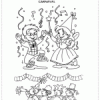
popular expressions are present in everyday vocabulary. Often, we don't even stop to think what they mean and how they came to be.
A popular expression tells about the culture and stories of a people and are fundamental to the identity national. In addition, expressions are often difficult to translate, as they may not have an equivalent term in other languages.
see more
Astrology and genius: THESE are the 4 most brilliant signs of…
iPhones that didn't succeed: 5 launches rejected by the public!
Surely you've heard and said several expressions on this list. check the meanings and origins of 15 popular expressions!
Meaning: to collect money with the help of several people to achieve a certain goal or buy something.
Origin: the expression comes from the Vasco da Gama fans — that's right, the team from soccer. Before games, fans collected money to share among themselves in case of victory. The value was marked by the animals of the jogo do bicho, and the cow represented one of the most desired prizes.
Meaning: a situation that has not been resolved and remains the same way it started.
Origin: this term also began in football. In the 1960s, the leaders of Palmeiras had already been together for 14 hours and decided to stop by a pizzeria.
The meeting ended up becoming a newspaper article, whose headline was “Palmeiras crisis ended in pizza”, symbolizing a situation without solution.
Meaning: to regret exaggeratedly.
Origin: the coloring of pitanga it resembles that of a face that has been crying and its shape is reminiscent of tears.
Meaning: someone who pretends to be a friend just to satisfy his personal interests.
Origin: the expression originates from the magazine The Cruise, which published O Amigo da Onça, a character from cartoonist Péricles Andrade Maranhão, between 1943 and 1961.
The character became popular for always taking advantage, without caring about friendships.
Meaning: to be expensive; acquire with great difficulty.
Origin: the origin was cited as a reference to Diego de Almagro, Spanish and conqueror of the Americas, who lost one of his eyes in an invasion. Afterwards, he claimed to have cost one eye of the face defend the interests of the Crown.
Meaning: bear the consequences of something caused by someone else.
Origin: the expression was born from the work Facetiae, by the Italian Giovanni Bracciolini, which tells the story of a duck seller who found a woman willing to pay him through sexual favors. The husband found out and paid for the duck in cash.
Meaning: to make a scandal in a public place, with the intention of taking satisfaction with someone.
Origin: The expression originates from the Carnival of Rio de Janeiro, when men used to pinch the buttocks of women in revelry.
To protect the ladies, other men dressed up as baianas and, when they found a rogue, performed a kick capoeira. What people could see was just a Bahian skirt flying in the air.
Meaning: accompany a couple and be alone.
Origin: this expression was born from the use of candles as a source of lighting. Servants held candles while their masters stood intimate, always with their backs turned to maintain privacy.
Meaning: give up on a situation.
Origin: The origin of the expression is not exact. There are reports that say that when the cow is dissatisfied with the milking, she kicks the bucket of milk. Another account states that a bucket is kicked over during execution on the gallows.
Meaning: something difficult to accomplish and, if it happens, serious problems can arise.
Origin: during Second World War, believed that the Brazil would not enter the war and they said that it would be easier for a snake to smoke. In response, the army used the image of a smoking snake as a shield when joining the victorious side.
Meaning: walk without destination.
Origin: the origin is from the sailors, who have their ships driven by a small boat that tows them aimlessly in the port. So browsers don't have to make an effort.
The expression is derived from the English word tow, used until today for tow truck, which is the winch.
Meaning: trust blindly.
Origin: the origin of this expression is macabre for being from Inquisition. To test someone, hands were wrapped in tow and the person was forced to walk with a hot iron rod.
Three days later, if the hand was burned, the person was sentenced to death. Thus, the expression became synonymous with blind trust in someone.
Meaning: disguised person.
Origin: during Gold Cycle, The Portuguese crown maintained abusive taxes on mining. To avoid losses, people began to place their gold inside carved wooden saints.
Meaning: flatterer.
Origin: the expression originated from the soldiers who were in charge of pulling the bags of supplies from superiors. Over time, it was used to speak of those who did service to gain recognition.
Meaning: move forward, be positive.
Origin: despite not having a proven origin, reports say that this expression was also born from football. In situations of discouragement, players must touch the ball to each other to try to go on the attack, and thus turn the game around.
Read too:


